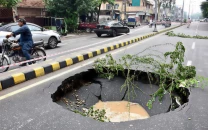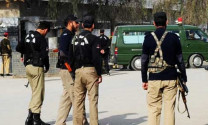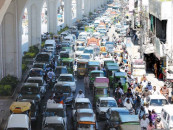Special report: Can Pakistan be stabilised through police reform?
Asia Society report breaks down problems and offers recommendations to achieve effective policing.

Special report: Can Pakistan be stabilised through police reform?
The average Pakistani citizen does not trust the police, while corruption in the ranks of the force is not a foreign idea either. But can the public rely on the law enforcement agencies when it really counts?
The answer is no, unless police reform is swiftly incorporated into the national agenda, according to a report by the Asia Society Independent Commission on Pakistan Police Reform. The report finds that Pakistan’s efforts to combat crime and counter terrorist activities are being outpaced by the innovation and agility of criminal networks and terrorist organisations.
The report entitled, ‘Stabilising Pakistan through Police Reform’, is the result of the convening of law enforcement and legal experts in Pakistan and the US, led by Asia Society Senior Adviser Dr Hassan Abbas. In his executive summary, Abbas discusses the report’s findings to highlight the bigger picture when it comes to whether Pakistan can provide effective policing and law enforcement.
“Pakistan’s police system suffers severe deficiencies in a number of areas, including equipment, technology, personnel, training, and intelligence capability,” Abbas says, adding that the police leadership and the rank and file appear to lack a sense of accountability to the public they are meant to serve.
Abbas notes that the system in the police force is simply not structured to reward good behaviour, as merit-based opportunities for professional advancement are scarce and even well-intentioned officers misuse their authority in order to survive.
Furthermore, even when forces are staffed with quality personnel, law enforcement bodies often lack technological resources needed to combat the most serious threats to internal security, the report finds.
“In most cases, police equipment is either outdated or nonexistent, while bureaucratic obstacles, intra-agency rivalries, and a lack of funding prevent the police from obtaining the technology needed to track down suspects,” Abbas says, highlighting how Pakistan lacks the capability to retrieve DNA from items used by the accused in a case.
Discussing the need for a well-defined counterterrorism strategy, the report finds that even though the National Counter Terrorism Authority (NACTA), established in 2009, seemed to be a promising step in the direction of coordinating and integrating the national counterterrorism effort between the military and the police, the civilian agency failed to take off as a result of political bickering over control.
“At the same time, anti-terrorism laws have failed to give law enforcement agencies and civil law institutions the power to handle cases effectively,” the report notes, citing the example of the Anti-Terrorism Act 1997, which established antiterrorism courts with powers to pursue terrorism suspects, but since the law had a broad definition of “terrorism”, it allowed for abuse by authorities, while also making it difficult to convict terrorists.
The statistics are astounding: Tried suspects in 282 out of 447 high-profile terrorism cases (63%) were acquitted by antiterrorism courts in Punjab in 2011.
However, some believe that the inadequacies don’t lie in legislation.
“It is not infirmities in our Criminal Procedure Code or the Evidence Act, but the predominant role of the Inter-Services Intelligence and the army in performing internal security duties not backed by law that largely explains the lack of convictions in terror cases,” says Babar Sattar, an accomplished writer and lawyer.
Lack of political will remains crucial obstacle
Senator Aitzaz Ahsan, a contributor to the report, addresses the lack of political will to reform the police force.
“Overall, the picture that emerges is dismal. The single thread running through this volume is that Pakistani governments lack the political will to reform the country’s police force,” says Ahsan.
Abbas writes in his forward that even though the Police Order 2002 was a constructive effort, as it sought to set up institutions and mechanisms that would allow the police to function honestly, it failed as a result of politicians and the police leadership seeking to consolidate their influence.
“Pakistan remains in the dog house of the international community mainly because its rulers refuse to accept that violence and conflict within the country is escalating and has serious ramifications for the entire region,” says leading lawyer and human rights activist Asma Jehangir, on the subject.
According to the report, a lack of resources, poor training, insufficient and outmoded equipment, and political manipulation pose tough challenges to the police force as it works to maintain law and order. Some key recommendations by the commission include reforms that aim to improve police technology, personnel, training, and intelligence capability.
Access the full report by Asia Society here.
Published in The Express Tribune, August 3rd, 2012.



















COMMENTS
Comments are moderated and generally will be posted if they are on-topic and not abusive.
For more information, please see our Comments FAQ